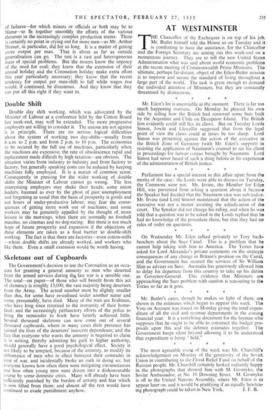Double Shift
Double day shift working, which was advocated by the Minister of Labour at a conference held by the Cotton Board last week-end, may well be extended. The more progressive employers are willing to consider it. The unions are not against it in principle. There are no serious logical difficulties about the system of working two day-shifts—usually from 6 a.m. to 2 p.m. and from 2 p.m. to 10 p.m. The economies to be secured by the full use of machines, particularly when the machines are expensive, the rate of obsolescence rapid and replacement made difficult by high taxation—are obvious. The situation varies from industry to industry and from factory to factory, but generally speaking costs can be reduced by keeping machines fully employed. It is a matter of common sense. Consequently in pressing for the wider working of double shifts the Minister of Labour cannot go wrong. The less enterprising employers may shake their heads; some union leaders, haunted as ever by the ghost of past-unemployment and forgetting as usual that the basis of prosperity is goods and not hours of under-productive labour, may fear the conse- quences of getting more work out of machines; and some workers may be genuinely appalled by the thought of more leisure in the mornings, when there are normally no football matches, no cinemas and no dog-racing. But there is not much hope of future prosperity and expansion if the objections of these elements are taken as a final barrier to double-shift working. The fact is that there are factories—even cotton-mills —where double shifts are already worked, and workers who like them. Even a small extension would be worth having.


































 Previous page
Previous page